On our eleventh day into the trip we went down to the breakfast buffet at the hotel and saw something we hadn't seen before. Now the hotels we stayed at ranged from very nice to nice to nice and inexplicably quirky. This particular hotel was nice and quirky, mostly for the frankly un-Islamic beer can displays in the dining room:
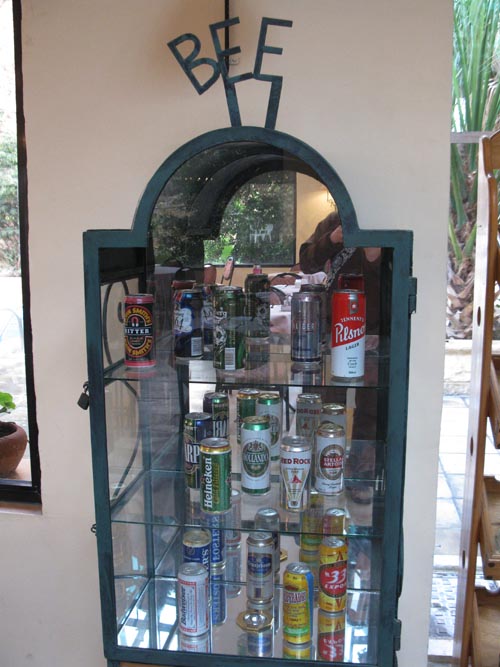
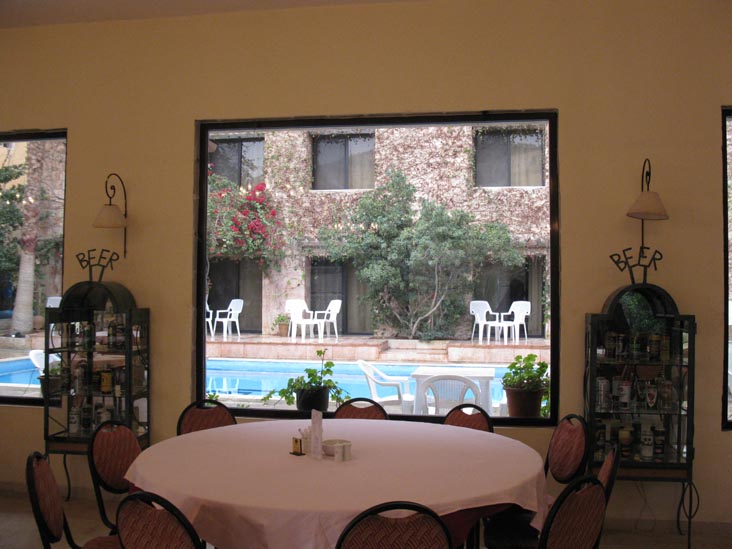
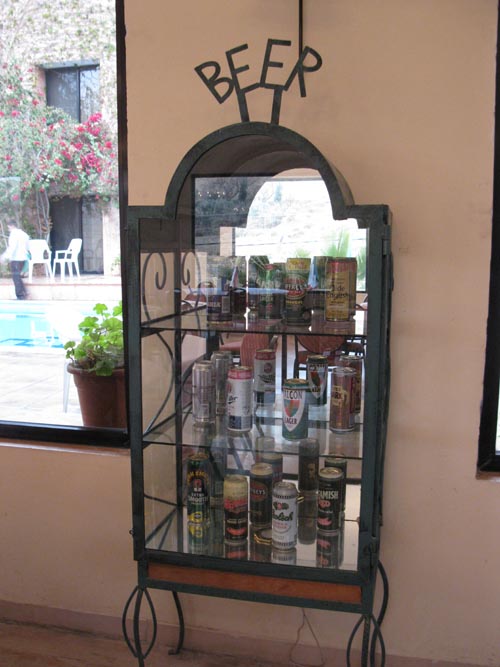
While I admit that it was sort of cool to see a vintage can of Rainier, the displays kind of had the feel of a frat house. Not sure you'd get that at the W or even a Doubletree. The message seemed to be "Tourists, we know what makes you comfortable, we know what you're looking for."
There isn't much drinking to do in Egypt or Jordan. We were thirsty in Aswan, for example — this following an overnight train ride and a long day visiting dams — and the restaurant was alleged to have served "ice cold Stella," at least according to the guidebook. Turns out that the guidebook was outdated. Our hearts sank a little. I ordered a yogurt drink instead.
I don't want to insinuate that it's disturbing that alcohol is somewhat rare in the Middle East but it's kind of disturbing that alcohol is rare in the Middle East.
Here's the thing: Food goes with alcohol. Not knock-your-socks-off Red-Bull-and-Vodka alcohol, but stuff like wine and beer. There aren't juice sommeliers that obsequiously pair slow-cooked lamb and, you know, mango juice or something like that. Plus, a good bottle of wine brings people together. It stimulates conversation. Western society is not all about bottle service and body shots.
I'm not really fooling anybody. There were times that I just wanted to drink a beer.
That's not to say that you couldn't find alcohol in Egypt or Jordan — it's "somewhat" rare, not "rare" — but there were some hoops to go through. First and foremost, even at the most tourist-friendly restaurants — even restaurants owned by foreigners — you only very rarely saw beer or wine listed on the menu. What happens is that the server comes over while you're skipping to the back of the menu and attempting to discern the different connotation of "cocktail" (it took several days to finally get that they really mean juice cocktails) and asks if you'd like anything to drink. You pause. He or she (mainly he) eventually sizes you up and reveals that they do in fact serve beer. You order a beer. You don't even ask what kind. There are only a few anyway. We know what you're looking for.
This charade kind of takes the fun out of ordering alcohol.
I can't quite put my finger on it, but there's something frustrating about going to a restaurant in Egypt or Jordan — not the local places but rather the tourist-friendly establishments — and only being able to get a yogurt drink with your meal. Or a juice. Juice is for breakfast, not dinner. (In the not-so-deep recesses of my mind I have some imperfect analogies at the ready that I'd rather not resort to, but suffice it to say, the word that comes to mind is "frustrating.")
At very good restaurants it feels like you fucked up and forgot that the place was BYOB. Other times it just seems like you're in an entire country of pregnant women. And George W. Bush.
And not to get all Twenty-first Amendment about it, but we'd talk to guys who had a really strange relationship with alcohol — they'd say stuff about binging that would make college R.A.s nervous. It didn't seem healthy.
And yet . . . you'd sit there nursing a juice with your mezze platter and start to second-guess your desire to imbibe. Maybe you didn't really need to drink hooch with a meal. Maybe mint tea is a perfectly good companion with rice and beef liver. And maybe the protesters really are being duped with Italian Nebbiolo.
Then again, I don't think so.
Like I said, I can't quite put my finger on it without thinking that everyone I know is W.C. Fields, but something about it made me a little uneasy. And then I go over to the liquor cabinet and fish around for that good bottle of single-malt — the one with the fraction of the ounce at the bottom that I'd been saving for nothing in particular — and all returns to normal.
See also the Big Map: Egypt/Jordan, December 27, 2010-January 11, 2011.
Posted: February 28th, 2011 | Author: Scott | Filed under: National Geographical | Tags: Alcohol And Your Liver, Grand Egypt & Jordan Adventure, Honey I Dropped The Baby, Self-Editing Distasteful Analogies, Wikipedia Calls W.C. Fields "Hard-Drinking" (I Checked)
One of the things Jen worried about while we were getting closer to Jordan was the issue of the passport stamp.
Because this was a "Grand Egypt & Jordan Adventure," we needed to get from Egypt to Jordan. There is a ferry from Nuweiba, Egypt to Aqaba, Jordan, but apparently this was only for day trips to Jordan, not for venturing farther into the country. At least that's what we understood the case to be. Not a big deal in the scheme of things — it just necessitated traveling over the land route through Israel.
But owing to the vagaries of Middle Eastern politics, it is advised — by that great passive voice in the guidebooked world of leisure travelers — that if you travel from Egypt to Jordan by land that you ask that your actual passport not be stamped. Some people say "refuse," but that makes it sound so, I don't know, severe. Our Lonely Planet guide to the Middle East explains it on page 332:
If you have an Israeli stamp in your passport (or an Egyptian or Jordanian border crossing stamp, which shows you've entered Israel), you'll be denied entry into Lebanon, Syria, Iran and Iraq.
. . .
The best solution to this problem is to get all visas and entry stamps stamped on pieces of paper, rather than on the passport itself, or, just to be sure, visit Israel last on your itinerary.
Now I like looking at my passport stamps. I don't have that many, so I treasure the ones I do have. It makes me look like I want to feel — like a world traveler. Before we left, I told Jen that I might actually want an Israeli stamp.
Jen then scoured message boards and websites and read anecdotes of travelers being denied entry into this country or that because of an Israeli stamp — even after flying into whatever country it was. She perhaps wants to travel to Syria or even Iran one day, so she wanted to make sure her passport was clean. In short, it would be a nightmare if I got an Israeli stamp and then we couldn't go to this country or that. Under no circumstances was I to get an Israeli stamp in my passport.
"This is no problem," our Egyptian guide told us as we drove up the road from Dahab toward Taba. He had the requisite blank Egyptian visa papers for the border officials to stamp. He explained that we'd have them stamp the Egyptian paper, then have the Israeli border official stamp a separate Israeli paper, then when we got to the Jordanian border, the Jordanian border official would stamp a separate Jordanian paper.
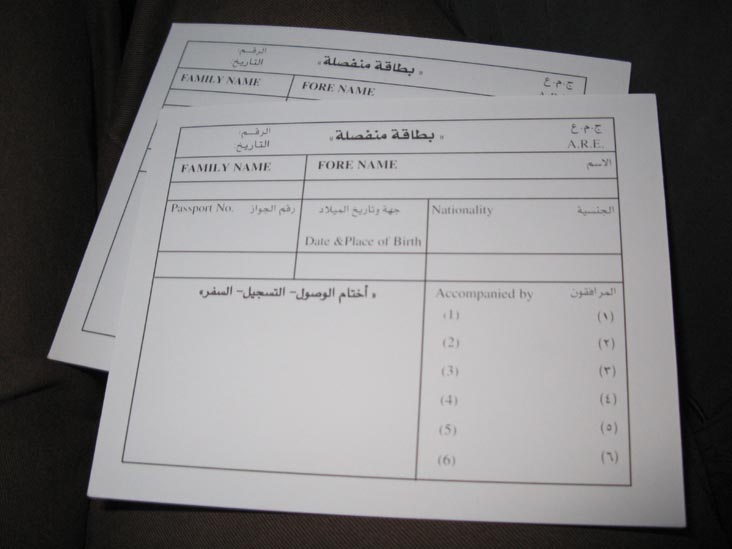
I didn't understand how someone could look at your passport and see one entry stamp from Egypt and one exit stamp from Jordan and not figure out that you stepped foot in Israel, Israel being the only route a traveler can take from one country to the other (I'm assuming one gets an exit stamp at the airport if one is flying from Cairo to Amman, for example).
Looking at maps, I'm guessing that it's about 15 miles from Taba to Aqaba by car. We rolled up to the border at Taba at about 9:41 a.m. and left the parking lot of the Aqaba border crossing at 11:31. That apparently is very fast, by the way. Here's what it looked like:
Dropped off at Taba Border Crossing, 9:45 a.m.:
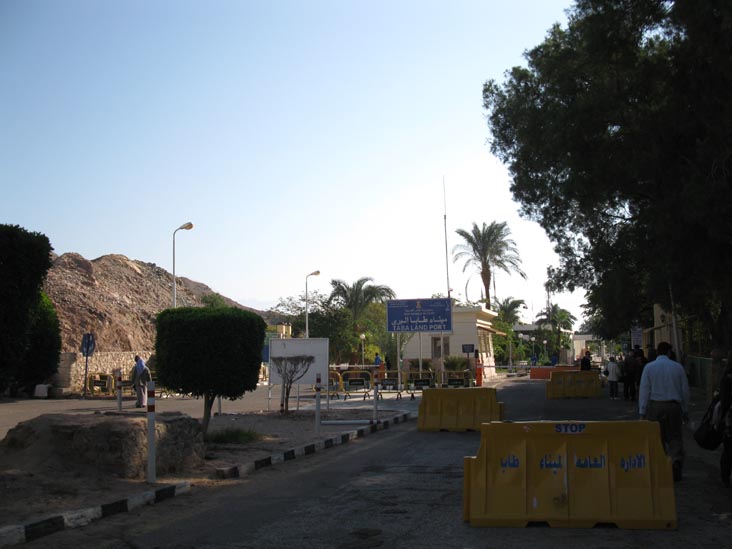
Walking through border crossing on the Egyptian side, 10:02 a.m.:
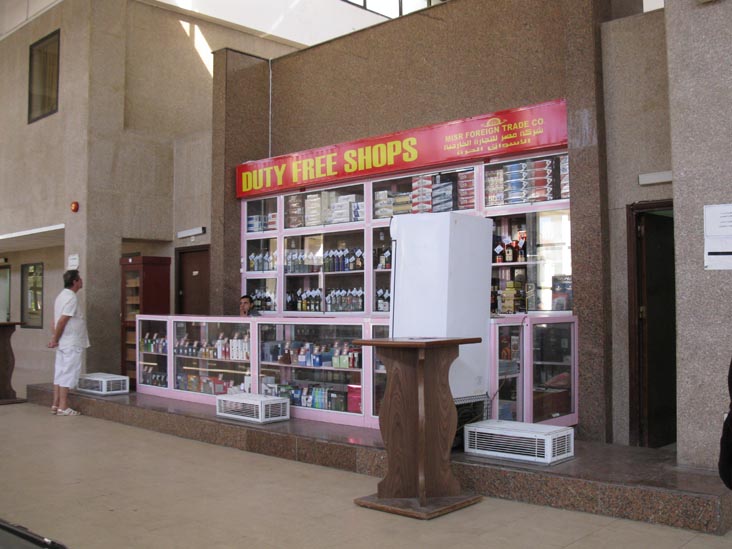
Egyptian departure card:
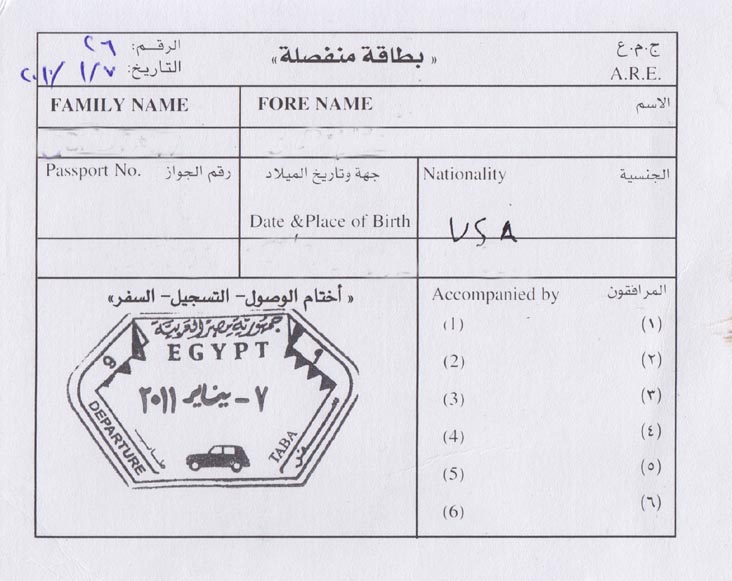
Walking through the no man's land between Egypt and Israel, 10:05 a.m.:
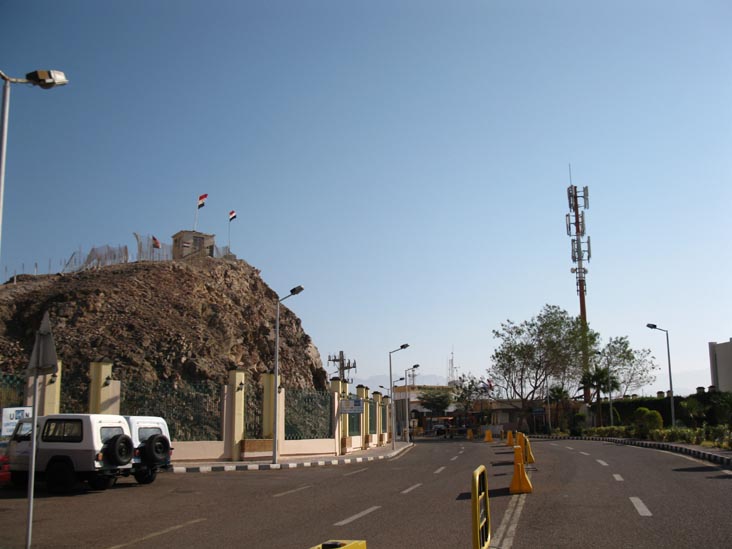
Entering Israeli border checkpoint, 10:07 a.m.:
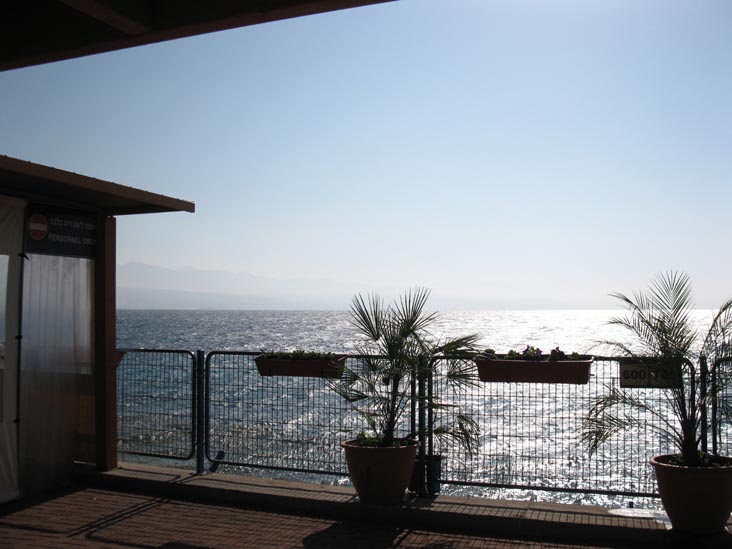
Israeli entry-exit card:
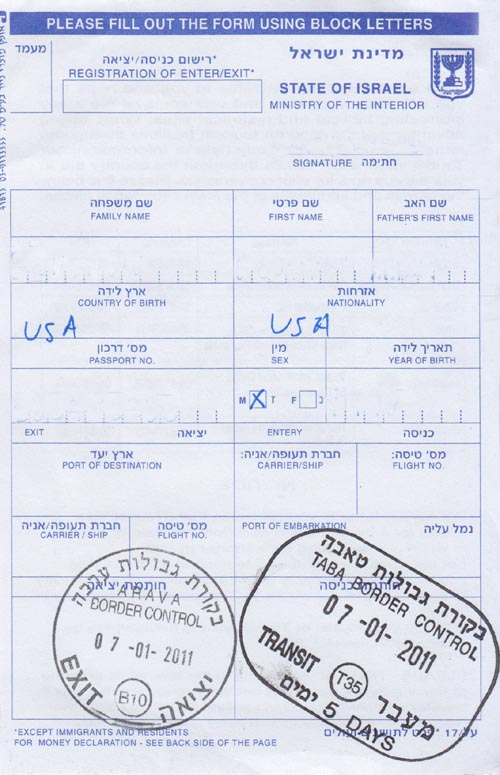
"Why do you want a separate card?" the Israeli border official asked Jen when she questioned us at the desk. To go to Syria, Jen told her. "Why do you want to go to Syria?" For the shopping, Jen explained — which is probably true — she's also wanted a Iranian-made rice cooker for some time, and until recently assumed that the 30-plus-year embargo would prevent her from ever getting one (she discovered that you can buy a version of this now including here and here).
Entering Israel, 10:33 a.m.:
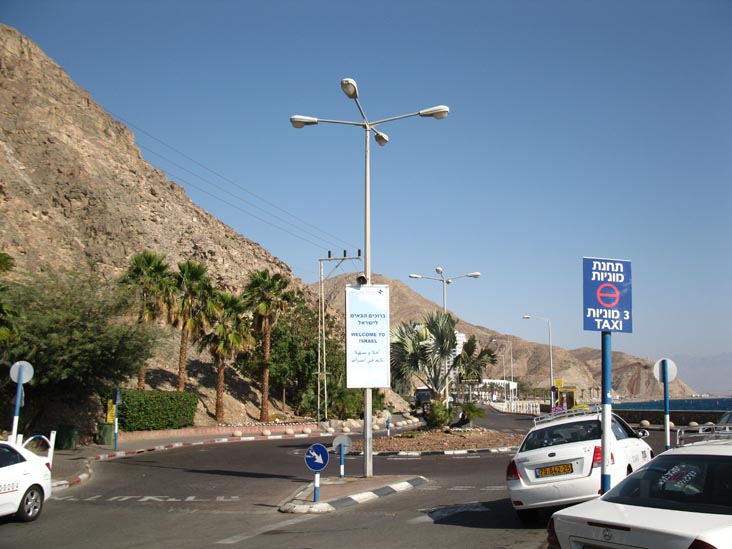
A helpful hint: If you are on the Taba border, wait until you get to the Israeli side to go to the bathroom. Best bathrooms of the entire trip, Jen enthused.
Because Egyptian tour operators don't operate in Israel, there's a nice cottage industry that exists for Israelis who will pick you up at the Egyptian border, drive you the fifteen minutes or so to the Jordanian border, make sure you get across OK and then go back to do whatever else it is they do during the day. I don't know how much they get paid, but it must be a pretty good deal.
It's strange to be in a country for only a half hour or so. Eilat looked nice, especially after so much of Egypt looked so dilapidated:

Jordan was pretty nice, but it didn't look as nice as Israel. This is not a political statement, just an observation.
Arava/Wadi Araba Border Crossing, 11:03 a.m.:
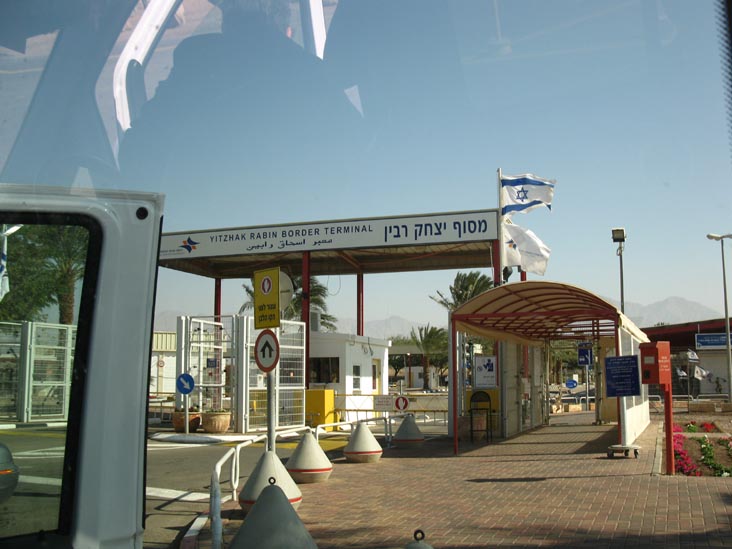
So two up, two down — all is good for us keeping our passports clean of any Israeli ink. No problems when we walked through the Israeli checkpoint — again, you have to walk — looks like how they depict a DMZ in the movies (I think we just watched the Angelina Jolie movie Salt on the plane ride from JFK to Amman) — just a long walk to the other side:

So we give our passports to the Jordanian border officials and Jen hears some furious stamping. She pokes her head into the window and throws up her hands — ack! — they're stamping our passports.
"It just means you won't be able to go to Saudi Arabia," our Jordanian driver said, "But there's no reason for you to want to go to Saudi Arabia." Jen tried to tell him that she might want to travel to Lebanon or Syria one day.
There was a delay. It turned out that the border officials quickly figured out their mistake — it was just on one of our passports — mine — and made steps to correct it. This basically says that the Jordanian stamp they stamped is inadvertent, and not to be construed as proof that I was actually at the Arava Border Crossing:

We were then handed salmon-colored cards with Jordanian entry stamps (I forgot to take a picture of it before it was taken by the border officials at the airport in Amman when we left) with stamps from the Arava Border Crossing.
And with that we left for Wadi Rum.
Now, again, I ask you — besides the fact that I just told you that we were in fact in Israel, isn't it obvious from my passport?
Here is one entry stamp from the Cairo airport:
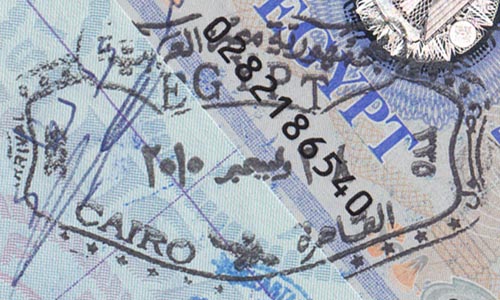
Here is one exit stamp from the Amman airport:
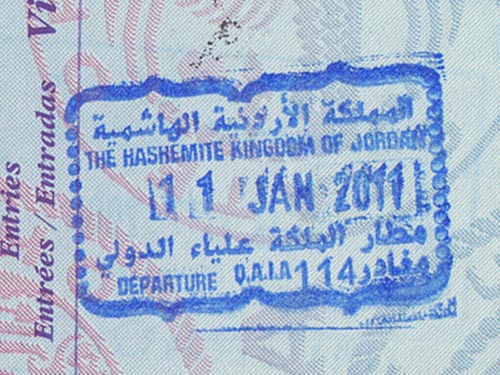
How do you think I got from Cairo to Amman?
Still don't get this one . . . don't know that I ever will.
See also the Big Map: Egypt/Jordan, December 27, 2010-January 11, 2011.
Posted: February 28th, 2011 | Author: Scott | Filed under: National Geographical | Tags: Grand Egypt & Jordan Adventure, Persian Rice Cookers, Shit From An Old Passport, Unbelievably Certain Parts Of Angelina Jolie Flims Stick In Your Memory, Why The Middle East Is Weird
There was a particularly strong (and frustratingly early) snow storm on the day we were supposed to leave for Egypt, one that made us almost regret our decision not to get travel insurance. And now, after watching more than ten days of protests in Egypt, I think we've definitely changed our minds about the usefulness of travel insurance.
This appears to be a pivotal point in Egypt's history, and while it's fascinating to see what's going on in a place that you just got back from, it's also natural to view events through the lens of your own worldview. Which is to say, while we've been anxiously watching what might unfold in the country, I also felt bad for all the tourists who never got to see the pyramids!
I first saw someone say this on the ABC Evening News several days ago when he was interviewed at the airport — an elderly (or almost elderly — don't want to offend him!) man said something along the lines of that he was in Egypt two weeks and "never got to see the pyramids." Here's another example — no clue if it's the same guy or not:
"We spent two weeks in Egypt and didn't get to see the pyramids," [a New Iberia, LA man] said. "But we saw everything else. It was scary, but it was exciting. We'll never forget this trip."
The snow storm meant that we missed one day of travel — the day we were scheduled to visit the pyramids. Michael joked that it would be crazy to have gone all the way to Egypt and not have seen the pyramids. At the time he said this — just before boarding an overnight train from Luxor that may or may not arrive several hours late in Cairo and thus disrupt our arrangements for a make-up visit to the pyramids on our free day — I didn't think it was something to joke about. But as it turned out, the train was on time, the tour operator's re-arrangements went according to plan, and we got to see one of the highlights — if not the highlight — of the entire trip.
Not to rub it in to the guy from Louisiana, but the pyramids were pretty cool. I like to say about a lot of the cool places that we've been lucky enough to visit — say, the Taj Mahal — that they were "as advertised" — which is to say, they were as awe-inspiring as everyone said they were going to be. The pyramids were "as advertised."
The first thing you notice about the pyramids is that you see them from all over the city:
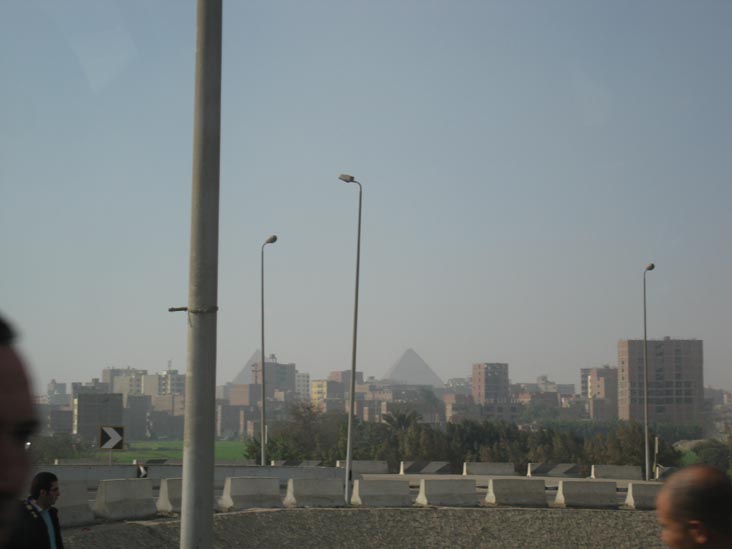
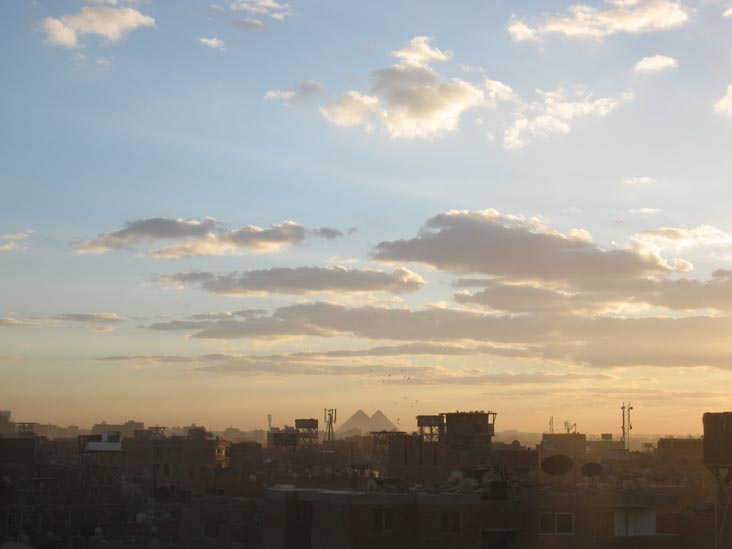
When you get to the site, there they are — the pyramids!
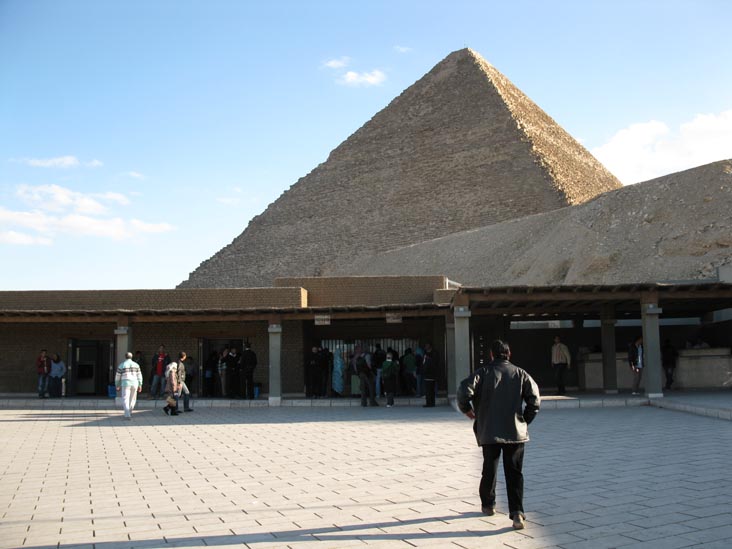
Our guide was telling us that there is a big project to build a tram or rail system of some sort through the complex that will also have the effect of preventing visitors from getting too close to the pyramids, so we were excited to get as close as we did to the Great Pyramid of Giza — as of now, you can still touch the blocks and even climb up a little bit:
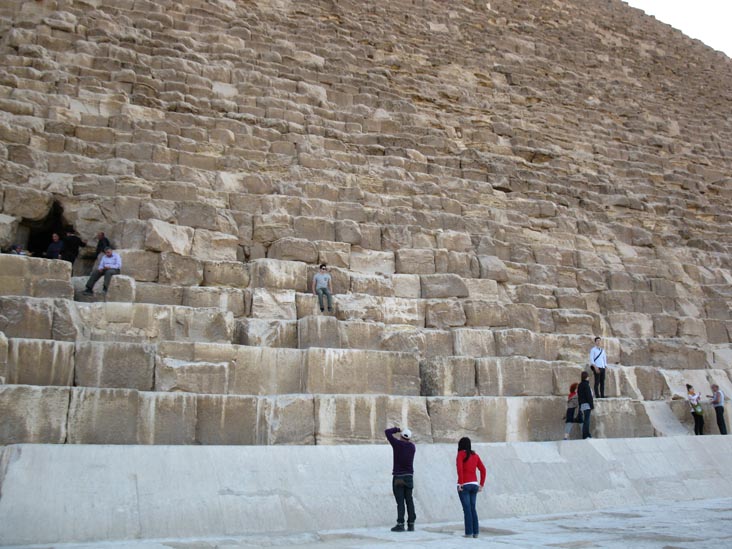
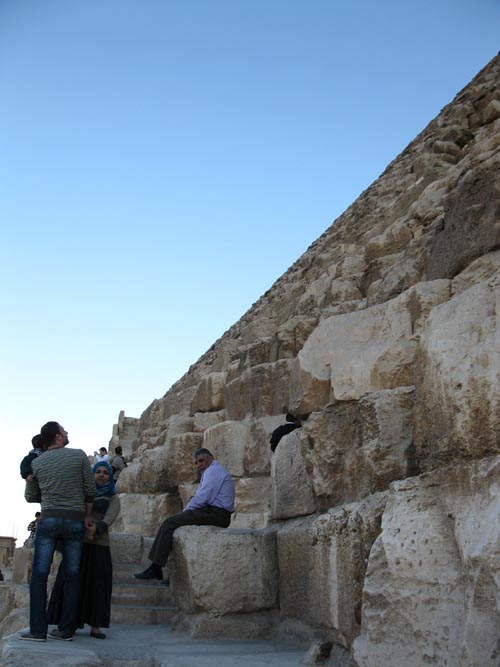
Each block weighs several tons, which drives home the point of how monumental the pyramids really are:
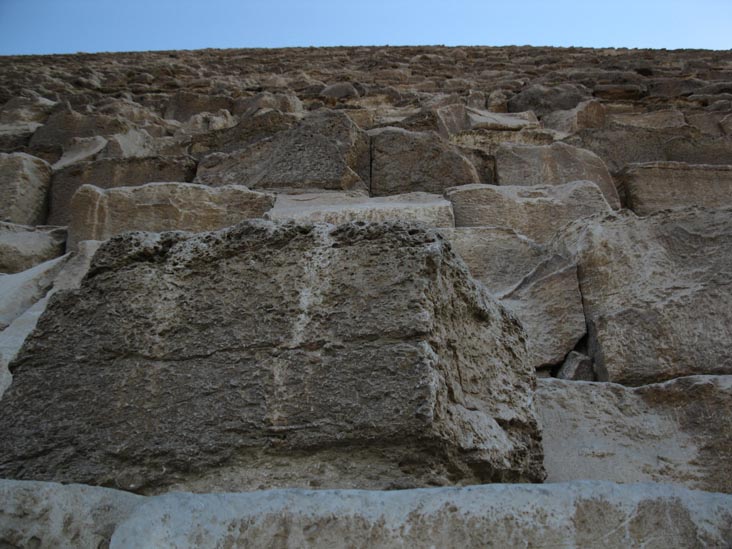
When you're there, you might experience that sense of self-satisfaction that accompanies the knowledge that you just ticked another Wonder of the World off your list:
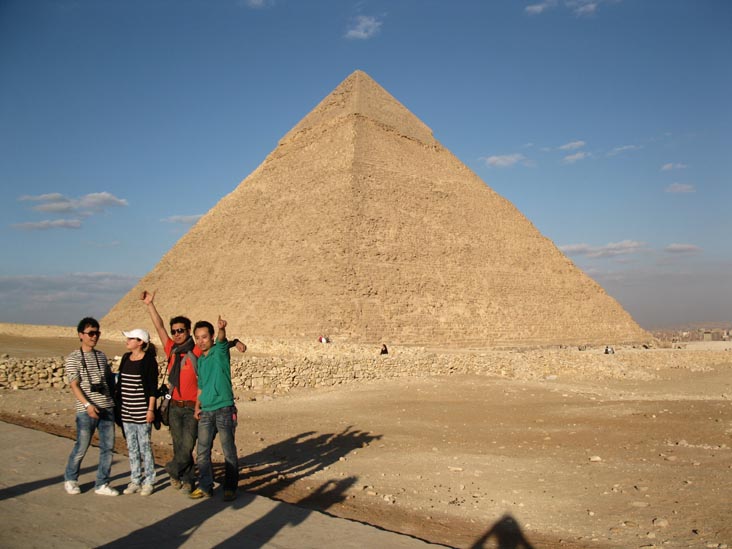
We spent a long day traversing Greater Cairo, visiting Saqqara and eventually making it to the pyramids. While at the pyramids, our guide tried to keep us on schedule, but we dallied, so we only barely made it to the Sphinx:
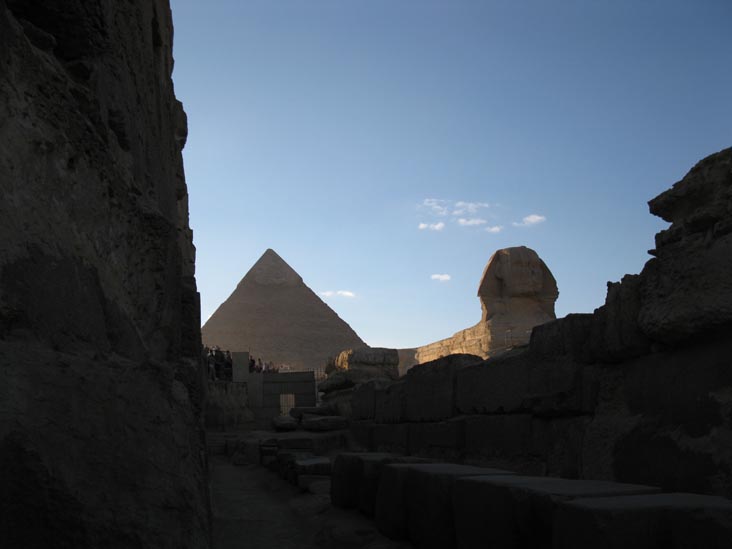
They start setting up for the nightly sound-and-light show early, which means that they close the entrance to get into the Sphinx area. Some Europeans bribed the guard to let them in but we saw a different opening around the back side where the camels rest. Damned if I wasn't going to snap a picture of the Sphinx — in good light, that is — so I ignored the camel men and scurried over to the fence. It sounds more dire than it was, but after a week in Egypt I was starting to feel a little disobedient. Mission accomplished:
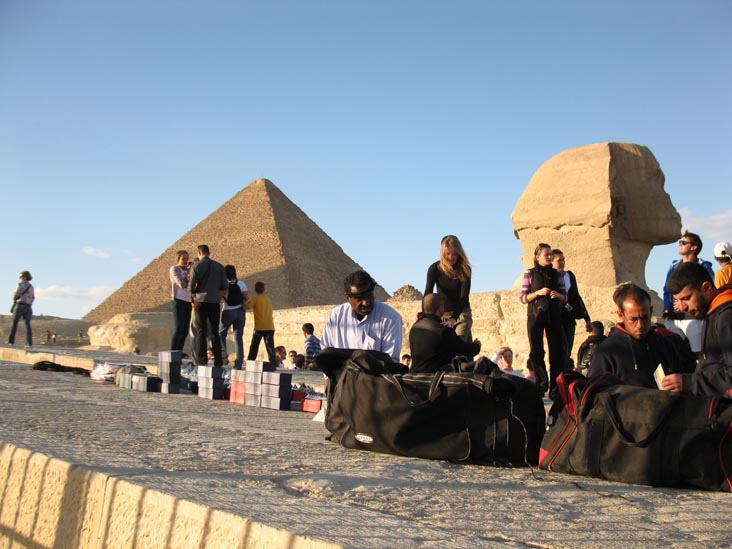
So this is what it looked like when I turned around — which is also to say, these people taking pictures have a picture of me taking a picture of them taking a picture of the Sphinx:
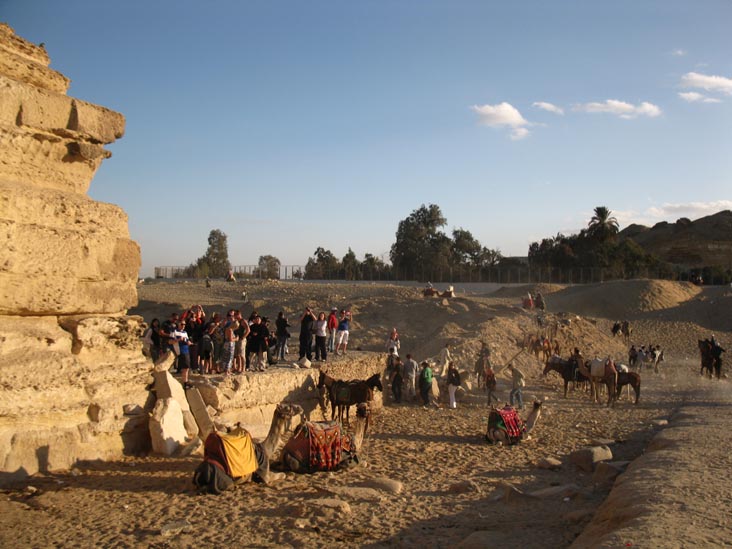
We walked away happy:
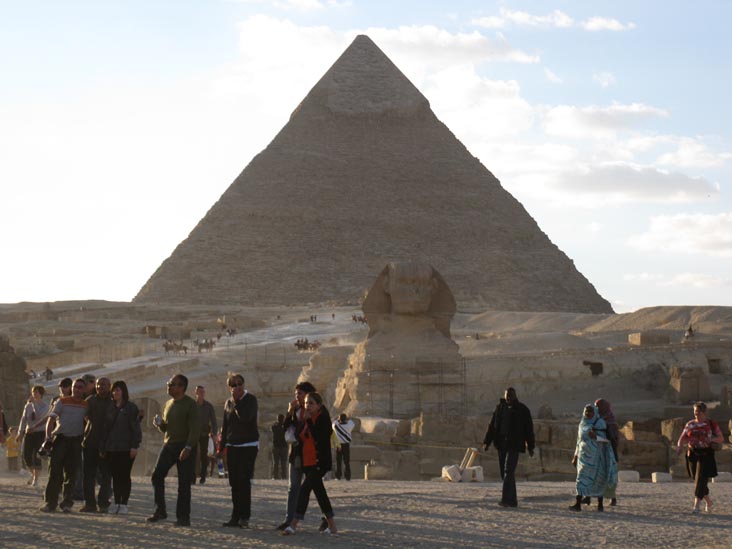
After seeing the pyramids, it was time to revisit a debate — or perhaps just a "conversation" — that I had with, er, someone I know about Machu Picchu. The general jumping off point for the debate/conversation is that while Machu Picchu may be a lot of things — mysterious, picturesque, remarkable — it's also relatively recent in the timeline of human civilization. That's "recent" as in Michelangelo-and-the-builders-of-Machu-Picchu-were-contemporaries "recent."
So you argue to your friend something along the lines of "just look at the intricate mortarless Incan brickwork on the Temple of the Sun — or even just the depiction of similar brickwork on bottles of Cusqueña Beer — it's ahead of its time!":
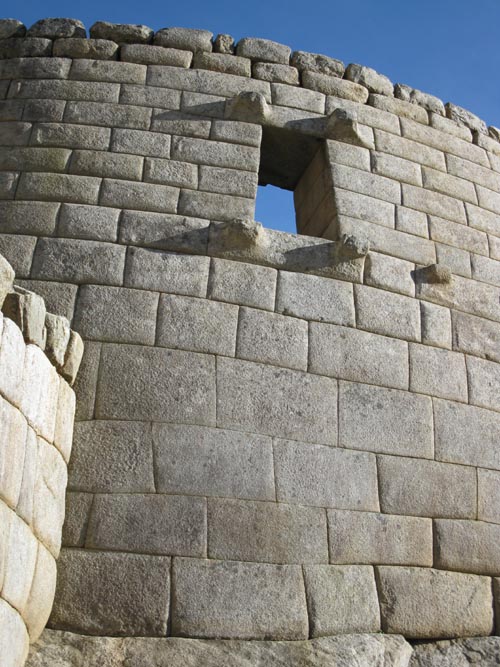
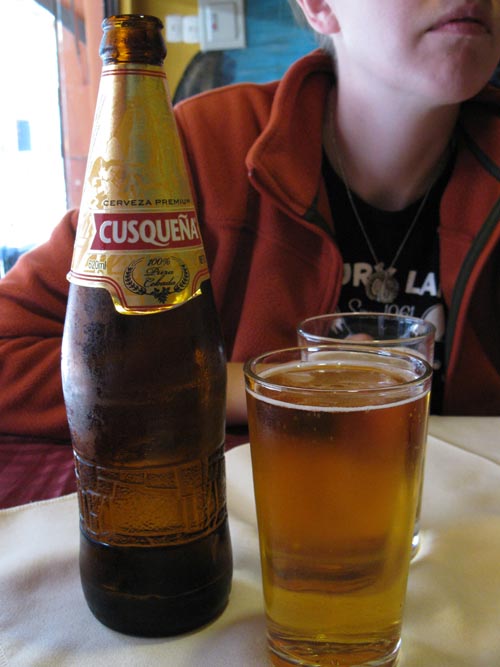
And that person might respond with something along the lines of "and then there's the Sistine Chapel." Or the pyramids.
To be fair, the argument is not so much that Machu Picchu isn't that great but rather that it might not be the amazing triumph of human civilization that you think it's going to be. Mysterious, picturesque, remarkable — yes. But the pyramids were built over 4000 years ago. Machu Picchu was built just over 500 years ago.
One of the benefits of seeing the pyramids later in the trip was that we got to work our way up to them, as opposed to seeing them first thing. This gave us more than enough time to indulge the Beatles vs. Rolling Stones Wonders of the World debate — Machu Picchu vs. the Pyramids.
I'd like to think that they're both really amazing — and "amazing" in the truest sense of the word — with all the awe/admiration/wonder that befits the term. And really, in the end it's apples and oranges. No Wonder is better than another Wonder. Except when people think they are.
Jen got Robert Morkot's Egypt: Land of the Pharaohs before we left and his introduction helps explain the world's fascination with Egypt. People have been traveling there as tourists since at least the Greeks, and Ancient Egypt held a special significance in the West from the 18th century onward as the European Grand Tour evolved into the Egyptian Grand Tour. Mozart's The Magic Flute was emblematic of the Egypt craze in Europe. Archaeological expeditions followed. Museums amassed collections of antiquities. The Egypt craze coincided with the rise in Freemasonry, and is why we have that weird pyramid-eye thing on the dollar bill. Later Cecil B. DeMille made movies about Ancient Egypt. Then came Indiana Jones and Ralph Fiennes.
In short, people have always loved Egypt. For example, I don't know the last time our landlord ventured the one stop on the subway into Manhattan, but she told me before we left that she's been wanting to go to Egypt for a long time now. Which is perhaps why my heart broke just a little bit for the guy on World News Tonight who said that he was in Egypt two weeks and never got to see the pyramids.
I think this also in part informs why the news from Egypt has been so front and center lately. Yes, it's the most populous Arab country and it's incredibly important strategically, but Egypt — not even the idea of Egypt but Egypt itself — is close to us. From grade school on we've learned all about Ancient Egypt. Steve Martin. The Bangles. All of that. It still excites our imagination.
A little travel can make you think you know more about the world than you actually do. That false sense of worldliness definitely comes into relief after you travel in Egypt. The sphere that tourists travel in is as far away from the sphere that Egyptians live in as one can imagine. All that is a preface to say that while it's problematic to comment too much on the situation in Egypt today, one thing has been bothering me.
Mubarak's initial response to the protests seemed — to an extreme outsider hanging out in the viewing gallery of the court of world opinion at least — fairly reasonable. His promise to leave in September and thus allow time to undo the constitutional excesses of the last 30 years didn't seem like such a bad idea. Tarek Masoud on PBS seemed to suggest that this was wise, if only to ensure that no one else could come in to take advantage of the constitution currently in place that is heavily weighted toward the office of the president. Further, getting Mubarak out of the way now might mean that the world would lose interest in Egypt and create an environment in which its next leader(s) would not be held to account. He has an op-ed in the Times this morning that expands on this idea:
Egypt's next scheduled presidential election is only months away. If the Constitution isn't amended before it is held, the notorious Article 76, which makes it difficult for independents like Mr. ElBaradei to get on the ballot, will still be in place. More important, the new president would have the same imperial powers Mr. Mubarak has had — the very powers that the Egyptian public wants taken away.
As we now know, the protesters were not happy with Mubarak's plan. I don't think anyone could blame them — the guy has held on to power for 30 years, so why should they trust anything he says? But what has been confusing to me is this — if the violence of the last couple of days actually has been instigated by forces close to Mubarak (as all accounts indicate), then Mubarak immediately loses this moral high ground. And in fact today American leaders seem to be coalescing around a unified position that Mubarak should step down sooner rather than later (i.e., September). Where before you had world leaders hemming and hawing about how "delicate" a situation it is in Egypt, now it suddenly seems a lot clearer who and what is making matters worse. In short, Mubarak has made a complicated situation very simple. I guess beating up on Anderson Cooper will do that.
I believe the reports and the speculation that the regime's strategy is to sow chaos in order to show that Egypt can't live without a strong, calming influence like Mubarak. It's so clumsy a move that I almost think it's on purpose — a convenient way for Mubarak to make a complicated situation very simple. We'll see what happens next.
See also the Big Map: Egypt/Jordan, December 27, 2010-January 11, 2011.
Posted: February 4th, 2011 | Author: Scott | Filed under: National Geographical | Tags: Above-Paygrade Geopolitical Commentary, Grand Egypt & Jordan Adventure, Greatest Disappointments Of All Time, Jockeying Over Which Seven Wonders Are Truly Wonderful, Machu Picchu Vs. The Pyramids, On The Usefulness Of Travel Insurance, The Fascination With Egypt
































